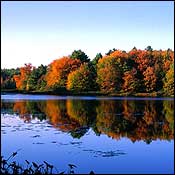
#5 (of 25) NEXT
The first time we visited Walden Pond, which is to say Walden Pond State Reservation, the setting for Henry David Thoreau’s now-mythic Walden, in a wooded area just outside Concord, Massachusetts, we were newly married, romantically inclined, and yet, since this was 1962, steeped in the sort of stoical-bemused irony fashionable at that time in literary circles. Which is to say, as admirers of Thoreau’s crankily brilliant classic of New England independence, we were prepared to be disillusioned by what we would find.
So it was a shock, and a kind of magic, that the grinding busy-ness of suburban Boston should yield so abruptly to a seemingly vanished world of nineteenth-century New England: scrupulously maintained (i.e., zoned) Concord, Thoreau’s birthplace, and nearby Walden Pond and the surrounding woods. Walden Pond, large enough to be called a lake by most observers, appeared to be unchanged in its stillness and beauty, like the mostly pine woods beside it. Thoreau himself, who took an unremittingly dim view of his fellow man (“The greater part of what my neighbors call good I believe in my soul to be bad”), would have had to admit, grudgingly perhaps, that much, if not all, of what he’d so loved at Walden had been preserved, however profoundly changed was the world beyond Concord.
Thoreau would have laughed at the solemnity with which the site of his crude log cabin (which had cost him $28.121⁄2 to build, in 1845) has been transformed into a monument on the north shore of the pond, but Thoreau would probably not have laughed at the romantic idealism with which this oasis of nature has been preserved. If one of our least attractive American traits is the rapacity with which we consume and despoil nature, one of our most attractive traits is the effort we make to preserve it.
Since 1962, we’ve returned to Walden many times. It’s the sort of sentimental journey to which the inevitable cliché “pilgrimage” is attached, and the sort of ritual that, within a relationship, comes to acquire strata of private emotional meaning. “I never found the companion that was so companionable as solitude” isn’t quite true for me, as it was for Thoreau, yet almost.
Each time we revisit Walden, it seems “unchanged.” Maybe this is so. Obviously, we are getting older, as Walden never ages. Each time, we seem to rediscover what it was about Walden, and the brooding spirit of Thoreau, that drew us to this place initially.
We hike around the pond, a distance of about two miles. We hike into the woods, which cover about 400 acres. To say that all this is “beautiful” is to say the obvious, and there is nothing to say about hiking in any idyllic place that can convey the visceral experience; just as trying to write about “nature” is folly. Especially, one would be very foolish to try to describe Walden Pond and its effect upon the viewer, when Thoreau has written so memorably about it, in his curiously impassioned yet painstakingly precise prose (see the chapter “The Ponds,” Walden). From Walden, it’s a short journey to Sleepy Hollow Cemetery, where you can see the modest grave of Henry David, but one of the Concord Thoreaus.
DETAILS:
Walden Pond State Reservation (978-369-3254). Concord’s Colonial Inn (800-370-9200; concordscolonialinn.com; from $145) was the Thoreau family home before it opened as a hotel in 1889. Longfellow’s Wayside Inn in nearby Sudbury (978-443-1776) offers New England fare like lobster pie and Yankee libations, including a cocktail billed as America’s first mixed drink.